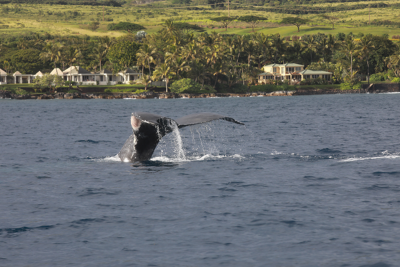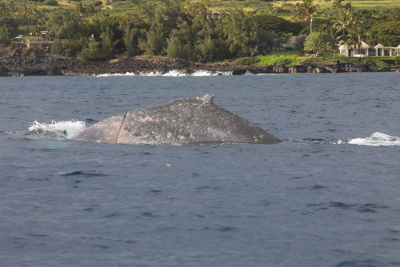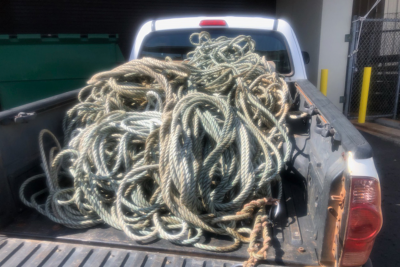An emaciated and distressed humpback whale has been saved after getting entangled in up to 2,500 feet of fishing line off the coast of Hawaii.
Photos of the rescue have been released by the National Oceanic and Atmospheric Administration (NOAA,) which partnered with the Hawaii Department of Land and Natural Resources, the U.S. Coast Guard and community members to free the whale over a 13-day operation that began on January 16.
Images show the humpback whale entangled in large quantities of ropes and fishing equipment, bearing visible signs of injuries apparently caused by the equipment. Underwater footage also shows gear trailing from the whale's body.
The NOAA said they had removed an estimated 2,300 to 2,500 feet of heavy gauge line from the whale during their rescue efforts.
The rescue operation began after the whale was sighted off Po'ipū on the Kauai coast visibly trailing fishing lines.
Over the following 12 days, various efforts to free the whale were made as it travelled west from Kauai to Niihau and back again.

"The humpback whale was emaciated, light-colored, and rough-skinned, with patches of whale lice—all indicative of a whale in distress," the NOAA said in a statement. "There was a large amount of gear trailing behind the whale, and responders have confirmed some of the gear originated from the whale's mouth.
"Mouth entanglements are especially dangerous for whales, as they often impact the animal's ability to feed and otherwise negatively affect the animals."
Registered whale entanglements in commercial fishing gear have increased in U.S. waters in recent years, with humpbacks frequently impacted by the issue. A 2019 study published in Global Ecology and Conservation found that there had been a sudden increase in whale entanglements off the West Coast of the U.S. since 2014.





The study examined various possible solutions to the problem, including using different colored or weaker lines, having a shorter fishing season and consumer boycotts of certain commercial fishing companies.
Around 300,000 whales, dolphins and porpoises die every year as a result of entanglement in fishing gear. Animals can drown if they are weighed down, unable to reach the surface for air. They can also starve because gear restricts their ability to feed. They can also suffer from trauma and infections as gear cuts into their flesh.
Among the images of the entangled humpback posted by the NOAA were clear gashes along its body seemingly made by the fishing lines. Tissue damage on the animal's skin was also visible.
The NOAA said that by January 28—the final day of the rescue—the whale's condition had deteriorated significantly, with the animal appearing emaciated and almost completely covered in brown-colored whale lice.
Their final day of operations on Friday succeeded in removing a final mass of lines the whale was still entangled in, but could not remove additional lines trapped deep inside the whale's mouth.
The NOAA said the animal had not been sighted since then and that its future remained uncertain. "It hopefully is under less stress and has a better chance of survival now that we've removed the majority of the line. Responders will continue to study the gear to determine its identity and possible origin," the organization said.
Uncommon Knowledge
Newsweek is committed to challenging conventional wisdom and finding connections in the search for common ground.
Newsweek is committed to challenging conventional wisdom and finding connections in the search for common ground.





